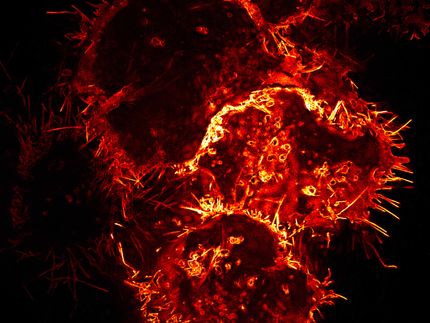Researchers examine effect of experimental Ebola vaccine after high-risk exposure
Advertisement
A physician who received an experimental Ebola vaccine after experiencing a needle stick while working in an Ebola treatment unit in Sierra Leone did not develop Ebola virus infection, and there was strong Ebola-specific immune responses after the vaccination, although because of its limited use to date, the effectiveness and safety of the vaccine is not certain, according to a study appearing in JAMA.
On September 26, 2014, a 44-year-old physician from the United States caring for patients in an Ebola treatment unit in Sierra Leone experienced an accidental needle stick, which was estimated to pose a significant risk of infection. Given the concern about potentially lethal Ebola virus disease, the patient was offered, and provided his consent for, postexposure vaccination with an experimental vaccine, VSVΔG-ZEBOV (which has entered a clinical trial for the prevention of Ebola in West Africa). Forty-three hours after exposure, the patient boarded a jet for medical evacuation to the United States and received the vaccine intramuscularly.
Mark J. Mulligan, M.D., of Emory University, Atlanta, and colleagues assessed the patient's response to the vaccine. The patient developed malaise, nausea and fever 12 hours after the vaccination while on the transport jet. A physical exam in the U.S. approximately 14 hours postvaccination (performed at the National Institutes of Health Special Clinical Studies Unit) indicated the patient was in mild to moderate distress from fever, nausea, malaise, myalgia (muscle pain), and chills. On day 2, the fever declined; however, severe symptoms continued along with mild nausea and arthralgia (joint pain). On days 3 through 5, the patient experienced resolution of symptoms and laboratory abnormalities. By day 7, he was completely asymptomatic.
Blood tests detected Ebola virus glycoprotein-specific antibodies and strong Ebola-specific adaptive immune responses. "The clinical syndrome and laboratory evidence were consistent with vaccination response and no evidence of Ebola virus infection was detected," the authors write.
"In the current patient, a self-limited, moderate to severe clinical syndrome began at 12 hours postvaccination. Future decision making about using this experimental vaccine for postexposure vaccination will need to balance the risks of harm from the vaccine or possible Ebola infection (both were unknowns at the time of the patient's exposure) against the possible benefit of vaccination (also unknown at the time of the patient's treatment)."
"Neither the safety nor the efficacy of the VSVΔG-ZEBOV vaccine for postexposure protection can be learned from this single case, but the clinical and laboratory parameters are informative at a time when there is a need to garner all information available on Ebola vaccines."



























































